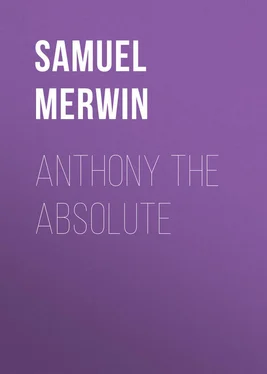Samuel Merwin - Anthony The Absolute
Здесь есть возможность читать онлайн «Samuel Merwin - Anthony The Absolute» — ознакомительный отрывок электронной книги совершенно бесплатно, а после прочтения отрывка купить полную версию. В некоторых случаях можно слушать аудио, скачать через торрент в формате fb2 и присутствует краткое содержание. ISBN: , Жанр: foreign_prose, на английском языке. Описание произведения, (предисловие) а так же отзывы посетителей доступны на портале библиотеки ЛибКат.
- Название:Anthony The Absolute
- Автор:
- Жанр:
- Год:неизвестен
- ISBN:http://www.gutenberg.org/ebooks/52507
- Рейтинг книги:5 / 5. Голосов: 1
-
Избранное:Добавить в избранное
- Отзывы:
-
Ваша оценка:
- 100
- 1
- 2
- 3
- 4
- 5
Anthony The Absolute: краткое содержание, описание и аннотация
Предлагаем к чтению аннотацию, описание, краткое содержание или предисловие (зависит от того, что написал сам автор книги «Anthony The Absolute»). Если вы не нашли необходимую информацию о книге — напишите в комментариях, мы постараемся отыскать её.
Anthony The Absolute — читать онлайн ознакомительный отрывок
Ниже представлен текст книги, разбитый по страницам. Система сохранения места последней прочитанной страницы, позволяет с удобством читать онлайн бесплатно книгу «Anthony The Absolute», без необходимости каждый раз заново искать на чём Вы остановились. Поставьте закладку, и сможете в любой момент перейти на страницу, на которой закончили чтение.
Интервал:
Закладка:
She just stood there.
“But you must do this!” I cried. “You have no right to withhold such a gift! God has sent you to me, and I shall use you. It will take a little time, but we shall practise, practise, practise! There will be failures, but we shall be patient. My life work is to be a true science at last. They can no longer say that it depends on the caprice of a single human ear. They shall now hear for themselves, they shall make their own comparisons, working with our absolute phonographic scale. Who knows, perhaps we shall yet make the final perfect scale of eighty-one distinct notes to the octave. No voice has yet done that. And no violin. For no living performer has the delicacy of ear and muscle.”
I began chuckling excitedly at this thought. I admit that my condition bordered on hysteria; but has not a man the right to be very slightly hysterical in the great moment of his life?
“We shall make many records,” I said to her, mopping my wet forehead. “Von Stumbostel shall have one, in Berlin – and Boag. Ramel and Fourmont shall have them, at Paris. And de Musseau, at the Sorbonne. And Sir Frederick Rhodes, at Cambridge. The new scale record shall be the basis of volume six – on ‘True Intervals and Natural Song.’ One copy I shall seal in a metal tube for preservation at the British Museum, together with my other records. And – yes, I shall send one to that miserable little von Westfall, of Bonn. I shall silence him. I shall crush him. It will amuse me to do that.”
I stopped, all glowing.
She looked at me until her lids drooped, and I could see her long lashes against the whiteness of her skin.
She fell back a step, hesitating, and shrinking a little, still clinging to the foot of the bed, and made a listless gesture with her left hand.
“You have broken into my room,” she said, steadily enough, but very low.
Women are literal.
But it was so. I had done just that. Doubtless it was an outrageous thing to do, but it had not seemed outrageous. It had come about quite naturally.
Still, she confused me. I had been talking volubly; now, all of a sudden, I could not speak at all. For the first time I fully realized how pale she was. And she looked tired about the eyes, where nervous exhaustion always shows first. It occurred to me, too, that her eyes were very blue and distinctly beautiful. I never saw longer lashes.
So I stood stupidly there, looking at her. I had flown too high. Now my spirits were dropping fast into a pit of depression. She suddenly appeared to me as a helpless, pitiful creature. God knows there was little enough privacy for her in this shabby hotel with its thin partitions and its ill-fitting doors and its drifting, dubious class of guests; and what little privacy she had I had violated. I looked at the dilapidated bureau that had stood across our common door. It had taken all my strength to push it aside. I wondered if she herself had moved it there. What a pitiful effort, if she had, to shield her tired, hunted soul from intrusion! “Will you please go!” she breathed.
I am afraid this nettled me a little At least, my coming in that wild way had not been a personal matter I had tried to make that much plain to her. Then why make it so personal! But that, of course, is the woman of it. And God knows I was wrong – all wrong.
“Will you please go!” she breathed again.
I bowed and turned to the door. But then I occurred to me as likely that I would no more than get my door closed before she would be in a frantic hurry to move the bureau back. And that bureau was too heavy for her, or for any woman. It was almost too heavy for me.
So I stepped back into her room and began tugging at the bureau again. When I saw the fresh concern on her face, I nodded toward the hall door and said, “I’ll go out that way.”
She understood this. She even came over and watched me as I worked at the thing. It would n’t move. Having no castors, the feet had caught in the matting. I went to the other end and pushed, but only succeeded in tipping it up, and spilling several articles to the floor. I let the bureau drop, and went down on my knees to pick them up. There was a hair brush and a nail buffer, both with heavy silver backs bearing the initials “H. C.” Then there was a small bottle with a glass stopper that came out and let the contents of the bottle run over the matting. And there was a wide tortoise-shell comb, of the sort that you pick up at Nagasaki.
I put all these things back on the bureau, and pushed again. She stood beside me in apparent hesitation, then, as if on an impulse, caught hold and pulled with me. But it was no use. The matting was by this time hopelessly wrinkled up about the feet. And after a moment of this we both stepped back and looked at it. I simply had to stop anyway and mop off my forehead and wipe my spectacles. I was all out of breath.
Then, after a moment, I took off my coat and dropped it on a chair.
“If you don’t mind helping once more,” I began —
She inclined her head.
“ – I’ll have to lift it over those wrinkles.”
So I caught hold and lifted with all my strength. She went around to the other side and threw her weight against it. Together we finally got it back squarely across the doorway.
“I’ve made you a great deal of trouble,” I said, “and I’m sorry.” I could n’t resist adding the question, “Did you move it here before, by yourself?”
She looked at me; then, slowly and guardedly, nodded.
I shook my head, ruefully I think. “You are a strong woman.”
“No,” she said, without any change of expression, with not the slightest animation of manner, “but it did n’t catch in the matting that time.”
I walked toward the door, with my coat thrown over my arm. It was hard to go away like that. I wonder why it is that I seem always to be walking away from women.
At the door I turned and glanced back at her. She was still there by the bureau, watching me go. I felt that she was looking rather intently at the coat on my arm, and it suddenly occurred to me that I must not leave her room like that, in my shirt sleeves. I felt the color come rushing to my face as I struggled into the coat.
I have read in works on the psychology of women that they often tell with a look what they are unable or unwilling to frame in spoken words. Certainly I knew that she had told me to put my coat on, and she knew that I had understood. And so, even as she drove me out of her room there was an understanding between us that was not wanting in subtlety. She had even asked me to make an effort to protect her; and she was no longer angry.
I had my coat on now, and was reaching for the door knob when a sound outside arrested my hand. Men were coming up the stairs to our hall.
She heard them too. She was rigid again, her hand resting on the bureau.
I could hear the Chinese porter talking pidgin-English as he came along the hall. Behind him sounded a ponderous step. Then came another voice, as the heavy step paused right near us – at my door, I thought.
“Here, boy, this is number nineteen.”
It was a loose throaty voice, unlike any other in the wide world. I should have recognized it anywhere, in a drawing-room or blindfolded at the bottom of a mine. It brought rushing to my mind pictures of a ship’s smoking-room where sat an old man with a wrinkled skin and one drooping eyelid who held forth on every subject known to man – pictures of the absurdly Anglo-Saxon hotel at Yokohama, and of a strange evening at the notorious “Number Nine” where an old man had smiled cynically at me.
Sir Robert had arrived at Peking. He had come to this hotel. He was to occupy room number nineteen, directly opposite the closed door behind which I stood, motionless, breathless.
Читать дальшеИнтервал:
Закладка:
Похожие книги на «Anthony The Absolute»
Представляем Вашему вниманию похожие книги на «Anthony The Absolute» списком для выбора. Мы отобрали схожую по названию и смыслу литературу в надежде предоставить читателям больше вариантов отыскать новые, интересные, ещё непрочитанные произведения.
Обсуждение, отзывы о книге «Anthony The Absolute» и просто собственные мнения читателей. Оставьте ваши комментарии, напишите, что Вы думаете о произведении, его смысле или главных героях. Укажите что конкретно понравилось, а что нет, и почему Вы так считаете.












